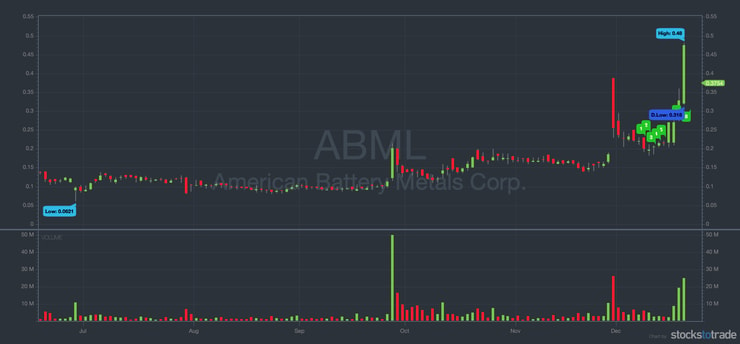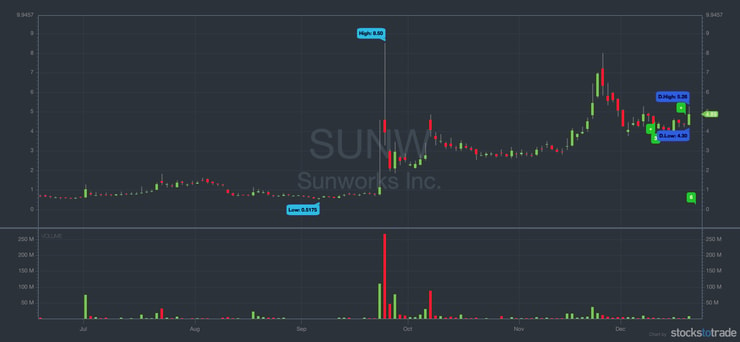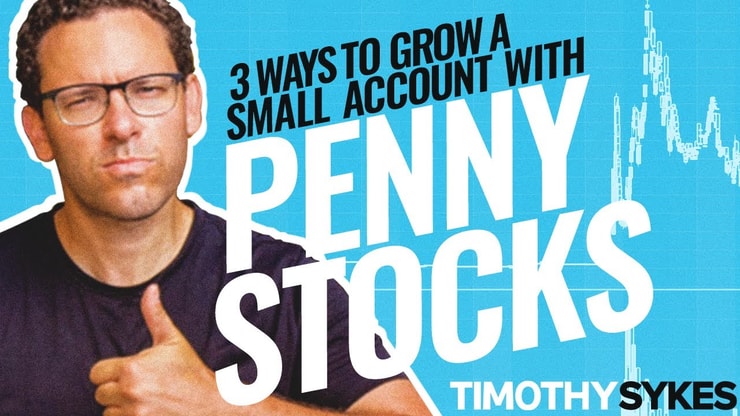Let’s talk stocks for beginners. Everyone starts in the market somewhere. So if you’re interested in stocks and a beginner? I like your dedication already.
It’s a beautiful thing to want to improve your life. I take that very seriously. This can be a very tough world to enter if you don’t get the right advice.
YOU SHOULD STUDY HARD EVERY SINGLE DAY, EVERY SINGLE NIGHT NO MATTER IF IT’S THE WEEKEND AS LONG AS YOU HAVE AIR IN YOUR LUNGS, STUDY, STUDY, STUDY & YOU’LL BE SHOCKED AT WHAT YOU WILL LEARN/ACCOMPLISH OVER TIME. GIVE IT A FEW YEARS & THANK ME LATER! #NODAYSOFF #HOWBADDOYOUWANTIT
— Timothy Sykes (@timothysykes) October 10, 2020
But if you’re willing to study hard … and committed to getting your trading mindset right…
You might just become a self-sufficient trader and learn to think for yourself in the market.
That’s one path you can follow. And then there’s another one I call the money mindset. It’s the path of least resistance. That’s what some want to sell you on.

Too many ‘gurus’ and flashy platforms want to make trading look easy. Just put some money on the next trend, and watch your account take off, right?
Or you could blow up your account. So let’s start at the beginning…
Newbies got spoiled, mistakenly thinking trading is easy & all picks are going to keep surging, I’ve been warning about an inevitable change in market environment & the last 2-3 days have shown that with today being the worst. You MUST stay humble or the market will humble you!
— Timothy Sykes (@timothysykes) July 2, 2020
Table of Contents
- 1 What Are Stocks?
- 2 The Advantages and Disadvantages of Stocks
- 3 What You Have to Know Before Investing or Trading Stocks
- 4 How to Trade Stocks as a Beginner (Step by Step)
- 5 2 of the Best Stocks for Beginners to Watch in 2021
- 6 Are Stocks a Good Investment for Beginners?
- 7 Are Penny Stocks a Good Way to Start Trading Stocks for Beginners?
- 8 Mistakes You Should Avoid When Trading Stocks
- 9 Frequently Asked Questions About Stocks for Beginners
- 10 Conclusion About Trading Stocks
What Are Stocks?
Stocks are basically tiny slices of a company. Companies often have millions of shares, so control isn’t on the table. Most stockholders are only interested in stocks for the money.
Investors look to make money by holding onto stocks for the long term. They hope these stocks will rise or pay dividends on earnings. This is absolutely not what you want to do as a penny stock trader, but it’s a decent strategy many long-term investors opt for.
To be clear, this is not my thing.
I’m more interested in trading penny stock momentum for faster gains. Traders look to make money by playing the market. They don’t care about a company’s long-term health or potential. A stock’s fundamentals are often beside the point here.
Learn more about how I approach this niche — get my FREE online penny stock guide here.
The Advantages and Disadvantages of Stocks

I’m not gonna judge stocks like they do in “investing for beginners” articles.
Those articles compare stocks to investment vehicles that are viewed as safer, such as bonds or mutual funds. Stocks are positioned as a riskier investment.
I don’t want you to ignore risk. Knowing your risk/reward should be part of each trade. Understanding what you can afford to lose is one of the ingredients for smart trading.
If follow me at all, I hope you already know rule #1: Cut your losses quickly.
Newbies often blow up their accounts by NOT CONSIDERING RISK. They find a pattern they like, a play they think has good potential. And they go all in.
The problem is that they don’t stop to consider the downside risk. And there’s ALWAYS a risk for any trade.
EXPERIENCE pays, newbies blow up, it’s always the same & yet they don’t realize it until it’s too late, nor do those who follow the newbies into risky/half-assed strategies by only thinking about the potential upside not the downside risks they take far too often #knowledgeiskey
— Timothy Sykes (@timothysykes) April 26, 2020
What You Have to Know Before Investing or Trading Stocks

If you wanna know how to buy stocks as a beginner, you really have to internalize this lesson.
Do NOT feel bad if you’re losing on any trade or what you newbies mistakenly believe to be “an investment” (sorry, it’s just laughable), remember that 90%+ of traders lose, newbies mistakenly believe trading is a fun, safe place, but they’re really are walking onto a battlefield!
— Timothy Sykes (@timothysykes) July 18, 2020
Sorry, I know I’m repeating my point. But it kills me that I take this more seriously than a lot of the people reading this article. How do I know that? Because statistics show most people lose money trading.
Many of you will fall for the pumps and believe that a penny stock that came out of nowhere will keep rising.
You’ll hold it too long.
Or you’ll be sure it’ll fall soon and you’ll bet against it. Only it won’t fall on your schedule, and you’ll get crushed.
That’s right, it isn’t just the suckers who fail at trading. This stuff is hard.
I know a lot of you are waiting to say, “Tim, can you stop with the warnings and just focus on hot plays?”
Well, no, I can’t. You might not know this — but I took a sacred oath to deprogram newbies.
That’s right, it’s my sacred duty to help YOU overcome the BS. So let’s get started.
What Kind of Investor or Trader Are You?
Let’s get the “how to invest in stocks for dummies” piece out of the way first.
You buy a stock, set a timer for 20 years … and profit. Or something like that. I wouldn’t know — I’m not an investor.
Still with me? Good. Let’s talk about trading.
There are a lot of ways to peel this potato. Here are the most common…
Day Trader
Day traders buy and sell stocks in the same trading day. This is the way I turned about $12,000 into over $6 million*…
And this is what I teach my students to focus on. More on this later!
(*Disclaimer that these kinds of gains aren’t typical, and they aren’t what I teach. They’re a product of the patterns and skills that I teach. Always remember that trading is a battlefield, and most traders walk away with losses. Do your due diligence, and never risk more than you can afford to lose.)
Position Trader
Position trading is longer-term trading. It’s actually more of an investing strategy. Position traders park their money in stocks instead of keeping it liquid. So they’re more concerned with things like diversification than short-term traders are.
Swing Trader
Swing trading is a mix of short-term and long-term trading. Timing is based on price swings. Most swing traders stay in positions for a few days, while others hang in for weeks or longer.
This can be less nerve wracking than day trading. It doesn’t require the same split-second timing. I think it’s a good skill to pick up.
Scalping
Scalping is a volume trading strategy. I don’t recommend it. It’s a super short-term way for traders to profit off of tiny fluctuations of the market.
This type of trading often reinforces bad habits. Scalpers are proud of the $10 they make on a good day, unaware of all the good trades they’re ignoring. And then they lose big on one of their high-volume trades and get wiped out.
Going Long
Every trading style includes a second choice. Should you go long or go short?
Going long is the “buy low, sell high” model. You buy a stock hoping the price will go up, and then aim to sell at a higher price for a profit.
Going Short
Going short, aka short selling, is where you try to profit from trading a stock when you think the price will fall.
To do this, you borrow shares from a broker and sell them at the current, too-expensive price. You wait for the stock to drop … if it does, you buy the borrowed shares and return them. You get to keep the price difference, minus any fees. And there will be fees! They can turn a good trade into a losing one.
This style of trading gets talked up a lot. But I don’t recommend it if you’re new to trading. There are so many ways to lose at short selling, especially in this market.
How Much Money Do You Need to Trade?
You don’t need a lot.
I started out with about $12,000. Every year, I fund my trading account with the same amount. I try to grow it the same way I did when I was just starting out.
This year I’m up over $1 million in profits for the year.* This doesn’t happen every year. 2020 is the exception, not the rule. But I always make some money. It doesn’t have to take a fortune to give you a good stake.
Maybe $12,000 is too much to aim for. I get that. But you don’t even need that much to start trading. You can start out with $4,000 like my student Roland Wolf. He passed $1 million earlier this year.*
Or aim lower and then higher. My top student Tim Grittani started out with just $1,500. That was nine years ago. He’s now made over $12 million — $3 million in 2020 alone!*
(*Please note that these kinds of trading results are not typical. Most traders lose money. It takes years of dedication, hard work, and discipline to learn how to trade. Individual results will vary. Trading is inherently risky. Before making any trades, remember to do your due diligence and never risk more than you can afford to lose.)
More Breaking News
- Valterra Platinum Strengthens Position with Impressive Earnings Surge
- Novo Nordisk’s Shares Surge as FDA Targets Illegal Drug Marketing
- AppLovin Gains as Analysts Highlight Growth Potential Amid E-commerce Boom
- Supreme Court Greenlights New Gold’s Game-Changing Acquisition by Coeur Mining
What Is Your Goal?
The results are in: setting goals works.
You have to have goals that are specific and inspire you to work hard! Once you set your big goals, the small stuff can start to fall into place.
Key Performance Indicators Aren’t Just for Corporations
Have you heard of key performance indicators — KPIs? KPIs are business-speak for measuring your performance. And measuring your performance is essential if you want to keep getting better.
Let’s say that you’ve been successful in six out of 10 trades this month. Try to aim for seven out of 10 wins next.
How to Trade Stocks as a Beginner (Step by Step)

All right, now for the good part. Let me break down your next steps.
1. How You Want to Invest in Stocks
Trick question — you don’t. Investing money isn’t my advice for beginners. We’re here to trade with rules, plans, strategies, and patterns.
2. Choose a Broker
There are many right ways to go about this choice — and a lot of wrong ones.
You’re looking for a few things in a broker. Timely execution is critical. The bigger brokers trade in volume, so they can usually get you fills on your orders. You never want to be stuck in a position without an exit plan.
E-Trade, one of the brokers I use, averages less than a second on its executions.
You want to understand a broker’s fees and how they can affect the types of trades you want to make. Commissions on trades have gone down across the board, to $0 in many cases. If you want to short sell — which, again, I don’t recommend — you’ll be paying fees.
Short sellers also want to be able to borrow shares.
Access to markets is important. Make sure your broker is able to buy OTC stocks if you want to trade penny stocks. If you pick the wrong broker, you can miss out on many of the small-cap penny stocks that I love to trade. These unpredictable stocks make for many of my favorite plays.
To all those using #Robinhood and #webull missing out on the absolutely amazing runups on $ALYI $AABB $BBRW $BRTXQ $IGEN $AXXA $SITS $ZICX $WKSP wake the hell up & realize you’re missing out on the plays that can truly grow your account EXPONENTIALLY! Read https://t.co/Ens8xBEzdW
— Timothy Sykes (@timothysykes) August 31, 2020
The last thing to look at is the platform. Many brokers provide you with decent stock screening capabilities. And many will link your portfolio to a news feed.
Of course, these trading tools become redundant when you follow my most important advice. Get yourself the best trading platform you can. For me, that’s StocksToTrade, the trading platform I helped to design. In my opinion, it’s got everything a trader could want. Try it here for 14 days for just $7.
There are a lot of choices out there. Take the time to find the right one.
3. Study, Study, Study
This is the most important step. I’m not gonna tell you how to pull that trigger just yet. Here’s what I recommend:
- Start with my free penny stock guide
- Sign up for my no-cost weekly watchlist
- Make a pledge to watch 30 trading videos in 30 Days
You can do all these for no cost.
4. Find Your Play
This is the point when all your ‘stocks for beginners’ research comes together and you start trading.
You’ve learned the basics…
… identified which patterns fit you best.
… and you’ve made your trading plan and you’re ready to go.
This is the point when you want to put some skin in the game. Trading is unlike anything else. Well, maybe it’s like skydiving, only your chute doesn’t open sometimes.
You can’t know how you’ll react. You’ve got to start getting some experience.
2 of the Best Stocks for Beginners to Watch in 2021

Instead of picks, I want to show you two stocks that are interesting for a number of reasons. I use technical analysis to find support and resistance levels for stocks. This helps me see patterns in their price movement.
I like former runners. I avoid stocks that practice dilution.
These are some stocks that pass the smell test so far. You can add these to a watchlist or you can learn from my notes and go find your own stocks to watch … Check the patterns, the catalyst, volume to learn the process.
American Battery Metals Corp (OTCQB: ABML)
At the end of September, Tesla (NASDAQ: TSLA) made some news that created ripples. On “Battery Day,” CEO Elon Musk spoke of the need to create a domestic supply chain for battery metals. The next week, the company announced a deal where Piedmont Lithium Ltd. (NASDAQ: PLL) would supply their lithium for five years.
This isn’t nothing. Tesla has been one of the hottest stocks throughout 2020. Electric vehicle (EV) stocks have been one of the hottest sectors.
The same day the Piedmont Lithium news broke, ABML spiked in sympathy. This happened all over the sector.
But if you look further back, ABML had been on a tear with a clean breakout.
I’ll keep watching this stock especially with the action in the EV sector. It’s been a dip buy before, and it’s got potential for that again.

Sunworks Inc. (NASDAQ: SUNW)
This next stock has given a master class on volatility.
If you’re going to trade like I do, you’ll come to love volatility. Don’t know why? Watch my no-cost “Volatility Survival Guide” to find out and prepare for it.
Sunworks was a sympathy play to SPI Energy Co Ltd (NASDAQ: SPI). SPI spiked from $1.07 to $32.47 on September 23, when it announced a new EV division.
Sunworks rose that day and the following one. Then it suffered a pullback when it shared a delisting notice it had received from Nasdaq.
This stock is a great lesson in riding a stock’s hype. Hype can help you as a trader, as long as you don’t get taken in by it.

Are Stocks a Good Investment for Beginners?
When you look up how to invest in stocks online, you’ll find all types of brokers ready to take your money.
The internet is filled with their come-ons. They tell you how much you’d have made if you bought Apple stock in 2000. (If you bought $1,000 at its dot-com bubble peak, it would be worth $118,000 today, if you’re wondering.)
These sorts of ‘what ifs’ are only put there to increase your thirst. And so-called investing experts make their careers out of selling thirst.
There are a lot of ways to make money with stocks. Investing isn’t the best one for me.
Are Penny Stocks a Good Way to Start Trading Stocks for Beginners?
This is the right type of question for beginners to ask. Trading is the best way to build a small account fast, in my opinion.
Trading Challenge
There is a next level to this.
On this level, you rise and grind. You build your trading days with a routine. You wake up early and get yourself in the proper mindset to succeed.
On this level, you join the ranks of my top students. A few of them have already become millionaires, and more are on the way.*

I live for this. I want to show you how to change your life. The more people I can invite into my inner circle, the more lives I can change. And not just for me and you, but all those around us.
This is my purpose in life, and like everything else, I take it seriously.
When you’re ready, apply for my Trading Challenge. It’s where I work to pass on everything I’ve learned in my 20+ years of trading to anyone who’s dedicated to learning the process.
Mistakes You Should Avoid When Trading Stocks
This should be its own article. I’ve written lots on the subject. Click those links.
Frequently Asked Questions About Stocks for Beginners
I know this thing can be tricky. Let’s cover all our bases.
How Many Stocks Should a Beginner Buy?
In trading, less is more. There’s a thing called overtrading — there’s no such thing called undertrading. Overtrading can be a quick route to blowing up your account. Focus on your education and the process first. Learn to take it one trade at a time.
How Can I Start Investing with Only a Little Money?
I get a lot of questions about how to invest in stocks from beginners with a little money … It’s simple. Forget investing and start trading. Check all the links and videos in this post to get started.
What Kind of Stocks Should You Avoid?
This is a good question. But remember, we’re not investing, we’re trading. In the penny stock niche, you’ve gotta presume that most are garbage and will fail. When you don’t buy into the hype, it’s harder for a stock to hurt you.
Conclusion About Trading Stocks

Listen, I’ll never promise you that you’ll make money doing this. What I can do is show you the right tools and techniques for succeeding in this world. What you do with it is up to you.
It’s up to you to make use of my no-cost resources. I’ve got a lot of them.
Newbies: I want to learn, but everything you have costs too much. Me: see my FREE https://t.co/KON0UF1Tu9 & read my FREE https://t.co/ZB6EtR1OtK rules & FREE https://t.co/LZD2Yz9Opu guide & FREE https://t.co/SKdarBuL7k book & FREE https://t.co/6oLl0jCQT5 videos & stop being LAZY!
— Timothy Sykes (@timothysykes) July 11, 2020
And it’s up to you if you want to take your skills to the next level. I’ve got over 6,000 videos on the subject. I’ve taught hundreds of students to become self-sufficient traders. Some have even become millionaires.*
The choice is yours. Choose wisely.

Did this ‘stocks for beginners’ post serve its tough-love purpose? Are you gonna read my penny stock guide next? Let me know that you’re committing to this life with a comment below!






Leave a reply